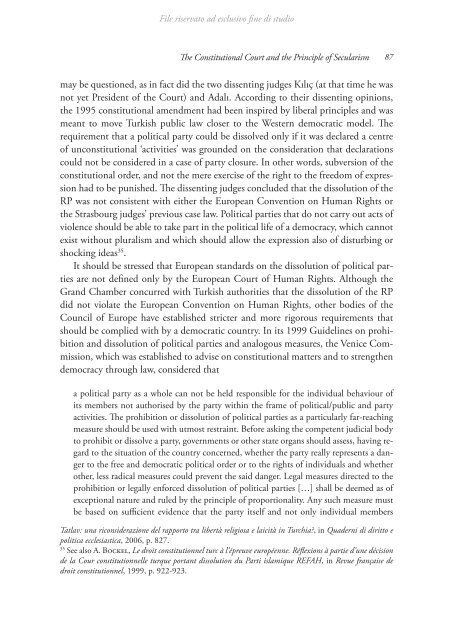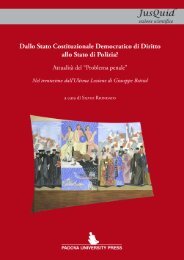il libro - Silvio Riondato
il libro - Silvio Riondato
il libro - Silvio Riondato
You also want an ePaper? Increase the reach of your titles
YUMPU automatically turns print PDFs into web optimized ePapers that Google loves.
F<strong>il</strong>e riservato ad esclusivo ne di studio<br />
e Constitutional Court and the Principle of Secularism<br />
may be questioned, as in fact did the two dissenting judges Kılıç (at that time he was<br />
not yet President of the Court) and Adalı. According to their dissenting opinions,<br />
the 1995 constitutional amendment had been inspired by liberal principles and was<br />
meant to move Turkish public law closer to the Western democratic model. e<br />
requirement that a political party could be dissolved only if it was declared a centre<br />
of unconstitutional ‘activities’ was grounded on the consideration that declarations<br />
could not be considered in a case of party closure. In other words, subversion of the<br />
constitutional order, and not the mere exercise of the right to the freedom of expression<br />
had to be punished. e dissenting judges concluded that the dissolution of the<br />
RP was not consistent with either the European Convention on Human Rights or<br />
the Strasbourg judges’ previous case law. Political parties that do not carry out acts of<br />
violence should be able to take part in the political life of a democracy, which cannot<br />
exist without pluralism and which should allow the expression also of disturbing or<br />
shocking ideas 35 .<br />
It should be stressed that European standards on the dissolution of political parties<br />
are not dened only by the European Court of Human Rights. Although the<br />
Grand Chamber concurred with Turkish authorities that the dissolution of the RP<br />
did not violate the European Convention on Human Rights, other bodies of the<br />
Counc<strong>il</strong> of Europe have established stricter and more rigorous requirements that<br />
should be complied with by a democratic country. In its 1999 Guidelines on prohibition<br />
and dissolution of political parties and analogous measures, the Venice Commission,<br />
which was established to advise on constitutional matters and to strengthen<br />
democracy through law, considered that<br />
a political party as a whole can not be held responsible for the individual behaviour of<br />
its members not authorised by the party within the frame of political/public and party<br />
activities. e prohibition or dissolution of political parties as a particularly far-reaching<br />
measure should be used with utmost restraint. Before asking the competent judicial body<br />
to prohibit or dissolve a party, governments or other state organs should assess, having regard<br />
to the situation of the country concerned, whether the party really represents a danger<br />
to the free and democratic political order or to the rights of individuals and whether<br />
other, less radical measures could prevent the said danger. Legal measures directed to the<br />
prohibition or legally enforced dissolution of political parties […] shall be deemed as of<br />
exceptional nature and ruled by the principle of proportionality. Any such measure must<br />
be based on sucient evidence that the party itself and not only individual members<br />
Tatlav: una riconsiderazione del rapporto tra libertà religiosa e laicità in Turchia?, in Quaderni di diritto e<br />
politica ecclesiastica, 2006, p. 827.<br />
35 See also A. Bockel, Le droit constitutionnel turc à l’épreuve européenne. Réexions à partie d’une décision<br />
de la Cour constitutionnelle turque portant dissolution du Parti islamique REFAH, in Revue française de<br />
droit constitutionnel, 1999, p. 922-923.<br />
87



